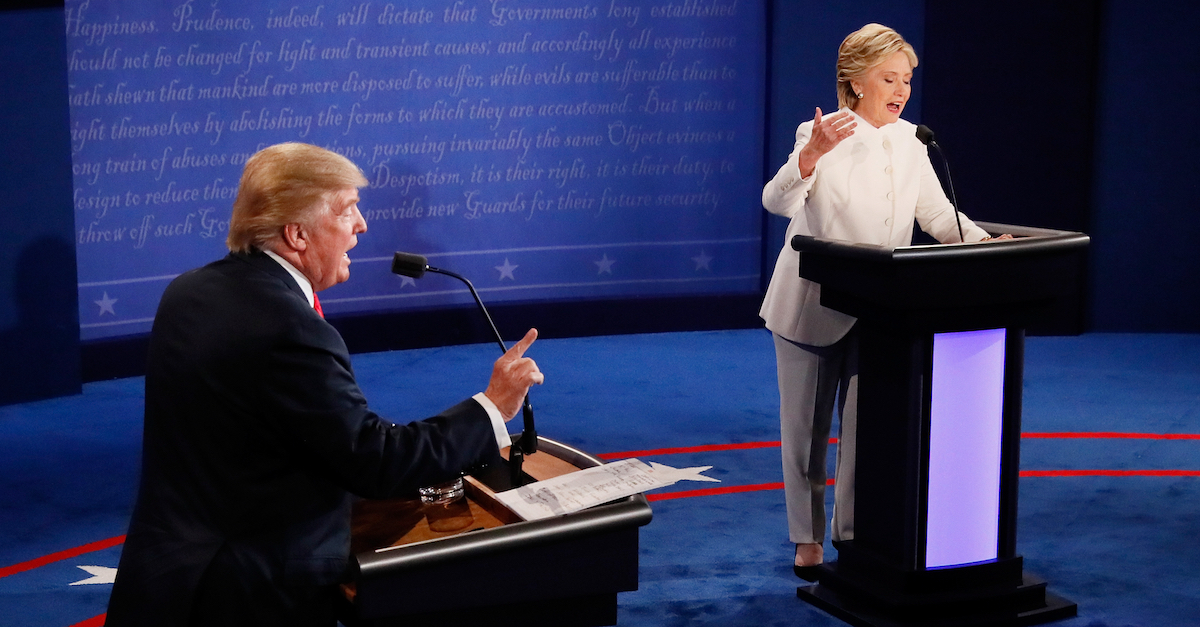
Donald Trump and Hillary Clinton debated on October 19, 2016 in Las Vegas, Nevada.
A federal court clerk’s office on Tuesday quibbled with attorneys for Hillary Clinton’s 2016 campaign over how to properly file a document in a sprawling civil lawsuit against myriad defendants, including the Clinton campaign and Clinton personally, by political rival and 2016 election winner Donald Trump.
The clerk’s message was a response to a mundane and perfunctory Rule 7.1 disclosure, which is a corporate disclosure statement by HFACC, Inc., the legal entity that was the Clinton campaign.
The underlying May 16 document asserted merely that the Campaign “has no parent corporation and that no publicly held corporation owns 10% or more of its stock” — nothing more, nothing less. The document was electronically signed by attorney Robert P. Trout of Washington, D.C., who also indicated in an attached certificate of service that he “caused to be filed electronically” the attestation itself. The name of another associate in Trout’s firm, Paola Pinto, appears in the docket as the person who uploaded the trivial yet required form.
According to the case file, Pinto was a member of the requisite federal court’s bar when the lawsuit began; Trout was admitted pro hac vice — for this case only — on Pinto’s motion.

Trump v. Clinton Document 150’s signature block.
The clerk’s office took exception to the division of labor — specifically as to the certificate of service attached to the disclosure filing signed by Trout.
“CORRECTIVE ACTION REQUIRED,” blared a Tuesday notice from the clerk’s office. “The name of [the] attorney e-filing this document via their . . . login does not match the name of attorney on the signature block of the document.”
The clerk’s notice then referenced the CM/ECF system. That’s short for “Case Management/Electronic Case Files,” the database that serves as a receptacle for federal court filings.
“The name used for login must match the typed name on signature block of the document,” the clerk’s notice continued. “This filing is a violation of Section 3J(1) of CM/ECF Admin Procedures and Local Rule 5.1(b). Filer must File a Notice of Striking, then refile document pursuant to CM/ECF Admin Procedures and Local Rules.”
Section 3J(1) states merely that a “document filed electronically, requiring an attorney’s signature, shall be signed” according to a certain format visual format.
The clerk didn’t mention it, but Rule 32 of the Federal Rules of Civil Procedure states merely that “[e]very brief, motion, or other paper filed . . . must be signed . . . by one of the party’s attorneys” (emphasis ours). It doesn’t indicate which attorney must do the filing. However, Section 2(B) of the CM/ECF Admin Procedures — another rule not referenced by the clerk — says local counsel (in this case, Pinto) is the one required to do the actual filing in the matter.
By Tuesday afternoon, Pinto filed a motion to strike the original document and had uploaded a corrected version which bears her electronic signatures in both the document itself and the certificate of service.

Trump v. Clinton Document 155’s signature block.
The clerk’s office, ironically enough, didn’t flag the Clinton campaign’s motion to dismiss the case entirely. Pinto uploaded that document, but Trout signed it.
Trump sued Clinton and others on March 24 on 16 separate claims, including alleged RICO violations, injurious falsehoods, malicious prosecution, computer fraud and abuse, violations of the Stored Communications Act, and principles of respondeat superior. The latter is the principle that an employer is generally responsible for harms committed by an employee — assuming those harms were committed within the scope of the employment.
The named defendants in the 108-page civil lawsuit include, but are not limited to, Clinton and her campaign, the Democratic National Committee, the Democratic Party law firm Perkins Coie, that firm’s former partner Michael Sussmann, Rep. Debbie Wasserman Schultz, Fusion GPS, Christopher Steele, former FBI Director James Comey, former FBI agent Peter Strzok, former FBI attorneys Lisa Page and Kevin Clinesmith, and former deputy FBI director Andrew McCabe. Also sued are several “John Does” and unknown corporations.
The primary defense posture of most of the defendants is that the claims are barred by a statute of limitations applicable to civil claims. However, Trump’s attorneys have also been accused of getting the facts entirely wrong and of failing to lay out a colorable RICO case.
RICO is short for Racketeer Influenced and Corrupt Organizations, a legal standard that allows claimants to tie together what might otherwise be disparate or unconnected untoward acts in an effort to show an illegal grand scheme or plan.
Trump’s attorneys previously asked a judge to allow them to “cure defects” with or to otherwise amend the original lawsuit.
Read some of the documents below:
[image via a Getty Images pool photographer who is not named in the provided caption]